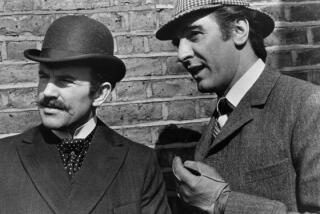Happy birthday Marcel Proust!
- Share via
Marcel Proust was born on this day in 1871. Happy 143rd birthday, Marcel Proust!
These days Proust is known as a genius, the author of the brilliant, mammoth novel, known as both “Remembrance of Things Past” and “In Search of Lost Time.” But how was he perceived through the years? How quickly was his legend cemented?
We took a quick spin through the Los Angeles Times archives for this snapshot of Proust and his not-always assured literary legacy.
1922: Proust dies. His LA Times obituary, published almost two months later, notes, “So brilliant a psychological study is [his] long work that M. Proust has been called ‘the French successor to Henry James.’”
1924: “Within a Budding Grove,” a new installment in his multi-volume novel, is published in English. From our review: “Proust has a marvelous talent, but none of those revealing flashes of insight which mark the genius.”
1925: The literary club in Highland Park, Los Angeles is treated to a lecture on great modern books, including Proust’s.
1929: Another volume of his great work, “The Captive,” is published in English. “With involved sentences, musings over moods and manners, and whatnot, the book is significant only for those anointed few who find Proust the genius of the age,” our reviewer scoffed.
1930: “The Sweet Cheat Gone,” another installment, is published in English. “It has been proclaimed as the greatest fiction of the age; condemned as formless and incoherent; banned as decadent; ruled out as the egotistic utterance of a morbid snob.... What seems at first brackish cold tea proves to be heady wine. One draught calls for another, until intoxication is complete. For Proust has the sure mark of genius, magic.”
1934: “A Remembrance of Things Past” is published in a four-volume English edition. “Marcel Proust was a master of all the delicate nuances of social life.... He was an analyst of moods and emotions; but he had, likewise, the gift for making the synthesis. He deliberately retired from a present that the true artist always avoids. He wanted perspective.... Whether such a novelist may ever make himself fully understood in translation is debatable.”
1937: A French magazine dismisses Proust’s work, declaring, “Proust is dead, well dead, as far from us as one can be.”
1947: Jean-Paul Sartre denounces Proust as a reactionary.
1948: In a short piece headlined, “Fallen Literary Idol’s Work Appraised”: “Marcel Proust was the rage in the 1920s, at least with literary snobs, but his prestige fell into decline during the following decade and his long, many-volumed novel still gathers dust for many.”
1957: Francoise Sagan, the 21-year-old author of France’s surprise bestseller “Bonjour Tristesse” explains she was expelled from school at 14 for “lack of spiritual decorum” -- reading Marcel Proust.
1958: The Times’ Robert Kirsch writes, “For so many years the great work of Marcel Proust, ‘Remembrance of Things Past,’ stood like a cathedral in a desert, an imposing and complex edifice mysteriously constructed out of materials nowhere to be seen in the landscape around it.”
1962: A $300,000 bid is made for Proust’s manuscripts. It is rejected.
1968: While staying in Palm Springs, Truman Capote tells The Times, “I am about to start the Proust Plunge, which I do about every five years. You take a big breath and go under for about six weeks with him.”
1971: The town of Illiers, where Proust spent some of his childhood and ate madeleines, changes its name, adding Proust’s fictional version of it, Combray. It remains Illiers-Combray to this day.
1971: Celebrating Proust’s centenary, a ball is held in Paris with attendees, including a bejeweled Elizabeth Taylor, wearing gowns designed by Yves St. Laurent, Valentino and Christian Dior all inspired by Proust and his work.
1972: An unnamed editor of a New York publishing house jokes that Proust’s novel is “the story of a man who fell in love with a cookie.”
1974: Harold Pinter takes on an impossible task: “I was bowled over. This is the greatest novel of the 20th century. How could I carve a screenplay out of 4.000 interdependent pages with their own unity and their own themes?” He finished the screenplay, but it was never filmed.
1982: Writer Cameron Crowe originally conceived of “Fast Times at Ridgemont High” as Marcel Proust as a Ridgemont senior.
1983: In a review of a new collection of Proust’s letters: “Like Dante or Machiavelli, Proust’s reputation rests on a single work. Students and admirers read his letters and early writings ... to search for precursors of the vivid characterizations and penetrating analyses, the profound themes and translucent style that make ‘Remembrance of Things Past’ a monument of literature.”
1988: The copyright of “Remembrance of Things Past” expires in France and becomes public domain, sparking a “Proust boom.” “Proust Belongs to You,” one French literary magazine declares. The novel is reissued in a luxury edition by his publisher Gaillimard, and four other publishers put out new versions, one including 312 pages of biographical notes. Videos about his life run in the Paris Metro. The novel is “one of the most celebrated works of the 20th century,” The Times writes, “a luxuriant unfolding of memory by a narrator of exquisite sensitivity.”
Like passing notes in class; I’m @paperhaus on Twitter
More to Read
Sign up for our Book Club newsletter
Get the latest news, events and more from the Los Angeles Times Book Club, and help us get L.A. reading and talking.
You may occasionally receive promotional content from the Los Angeles Times.








